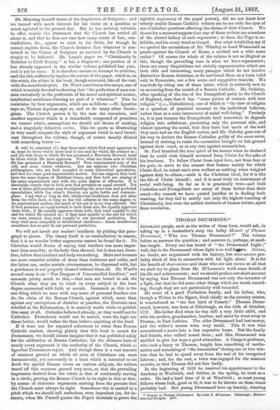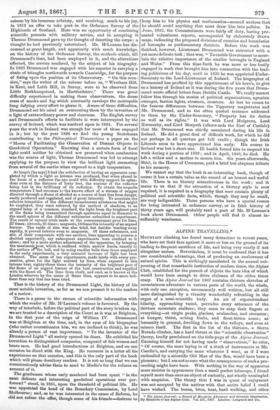THOMAS DRUMMOND.*
IGNORANT people, such as the writer of these lines, would ask, in taking up in a bookseller's shop the bulky Memoir of Thomas Drummond, " Who was Thomas Drummond ?" The volume before us answers the question ; and answers it, perhaps, at need- less length. Every one has heard of " the Drummond Light ;" well, this is the Drummond whose light is so well kown. Savans, no doubt, are acquainted with his history, but demi-savans pro- bably think of him in connection with his light alone: It is for the benefit of demi-murals and those who are not means at all that we shall try to glean from Mr. M'Lennan's work some details of his life and achievements ; and we should preface our short account by saying that Thomas Drummond was not only the inventor of a light, but that he did some other things which are worth record- ing, though they are not particularly well recorded.
He came of a good Perthshire family, and his father, who, though a Writer to the Signet, lived chiefly on the country estates, is remembered as " the last laird of Connie." Thomas Drum- mond, however, was born at Edinburgh, on the 10th of October, 1797. His father died when he was still a very little child, and with his mother, grandmother, brother, and sister he went away to Preston, in East Lothian. The elder Drummond had lost money, and the widow's means were very small. This it was that necessitated a move into a less expensive home. But the family had friends, who rallied round them ; and Mrs. Drummond was enabled to give her boys a good education. A Glasgow professor, who took a fancy to Thomas, taught him something of mathe- matics and something of "the humanities" during one or two win- ters that he had to spend away from the seat of his recognized labours ; and, for the rest, a tutor was engaged for the summer months, so that Thomas did not fare badly.
In the beginning of 1813 he received his appointment to the Academy at Woolwich, and thither, in the spring, he went as a cadet. He had a hard time of it at Woolwich ; as most young fellows whose luck, good or ill, it was to be thrown on those times probably had. But young Drummond bore up bravely, winning
• Memoir of Thomas Drummond. By Sohn F. 111%atinan. Edinburgh : Edwin- ston and Douglas. 1807.
esteem by his immense sobriety, and receiving, much to his joy, in 1819 an offer to take part in the Ordnance Survey of the Highlands of Scotland. Here was an opportunity of combining scientific pursuits with military service, and in accepting it Thomas Drummond gave up the thought of deserting the corps: a thought he had previously entertained. Mr. WLennan has dis- coursed at great length, and apparently with much knowledge, on the history of the Ordnance Survey, the methods which, till Drummond's time, had been employed in it, and the alterations effected, the service rendered, by the subject of his biography.
In 1823 Drummond was engaged with his superior in carrying a chain of triangles northwards towards Cambridge, for the purpose of fixing upon the position of its Observatory. " On this occa- sion," says the writer of the volume before us, " Wrotham Hill, in Kent, and Leith Hill, in Surrey, were to be observed from Little Berkhampstead, in Hertfordshire." There was great difficulty experienced in making these observations, the dense mass of smoke and fog which constantly envelope the metropolis long defying every effort to pierce it. Aware of these difficulties, Drummond set his mind on overcoming them by the invention of a light of extraordinary power and clearness. The English survey and Drummond's efforts to facilitate it were interrupted by the survey of Ireland, which was resolved upon in 1824. For several
years the work in Ireland was enough for most of those engaged in it ; but by the year 1826 we find the young Scotchman contributing to the Philosophical Transactions a paper on the "Means of Facilitating the Observation of Distant Objects in Geodetical Operations." Knowing that a certain form of focal light could neither be obtained nor preserved when combustion was the source of light, Thomas Drummond was led to attempt applying to the purpose in view the brilliant light emanating from several of the earths when exposed to a high temperature.
At length [he says] I had the satisfaction of having an apparatus com- pleted by which a light so intense was produced, that when placed in the focus of a reflector the eye could with difficulty support its splen- dour even at the distance of forty feet, the contour of the reflector being lost in the brilliancy of its radiation. To obtain the roqusite temperature I had recourse to the known effect of a stream of oxygen directed through a flame of alcohol as a source of heat free from danger, easily produced and regulated, and of great intensity. To ascertain the relative intensities of the different incandescent substances that might be employed, they were referred, by the method of shadows, to an argand lamp of a common standard, the light from the brightest part of the flame being transmitted through apertures equal in diameter to the small sphere of the different substances submitted to experiment. The result of several trials made at the commencement gave for lime, 37 times; zirconia, 31 times; magnesia, 16 times the intensity of an argand burner. The oxide of zinc was also tried, but besides wasting away rapidly, it proved inferior even to magnesia. Of these substances, and also of their compounds with one another, lime appearing to possess a decided superiority, my subsequent experiments were confined to it alone; and by a more perfect adjustment of the apparatus, by bringing the maximunkeat, which is confined within narrow limits, exactly to the surface orthe ball, and by using smaller balls than those employed in the early experiments, a very material increase of light has been obtained. The mean of ten experiments, made lately with every pre- caution, gives for the light emitted by lime, when exposed to this intense heat, eighty-three times the intensity of the brightest part of the flame of an argand burner of the best construction and supplied with the finest oil. The lime from chalk, and such as is known at the London wharves by the name of flame lime, appears to be more bril- liant than any that has been tried.
That is the history of the Drummond Light, the history of his most notable invention, as far as we can present it to the readers of a review.
There is a pause in the stream of scientific information with which the reader of Mr: M'Lennan's volume is favoured. By the way of interlude, before the political part of the story is taken up, we are treated to a description of the Court as it was at Brighton, in the first year of the reign of William IV. Drummond was at Brighton at the time, and, in the eyes of his biographer (who rather overestimates him, we are inclined to think), he was already a person of vast importance. " To the inventor of the Drummond Light" all society opened its doors. He exhibited his invention to distinguished companies, composed of fair women and brave men. He had good introductions at Brighton, and on one occasion he dined with the King. He recounts in a letter all his experiences on that occasion, and this is the only part of the book which will please desultory readers. It is not so long that we can conscientiously advise them to send to Mudie's for the volume on account of it.
The gentleman whose early manhood had been spent " in the most delicate and interesting geodetical operations ever per- formed" stood, in 1831, upon the threshold of political life. He was appointed the head of the Boundary Commission, by Lord Melbourne ; and, as he was interested in the cause of Reform, he did not refuse the offer, though some of his friends—desirous to
keep him to his physics and mathematics--seemed anxious that he should avoid anything that must draw him into politics. In June, 1832, the Commissioners were fairly off duty, having pre- sented voluminous reports, accompanied by elaborately drawn maps, indicating the proposed divisions of counties and boundaries of boroughs as parliamentary districts. Before this work was finished, however, Lieutenant Drummond was entrusted with a yet more delicate task ; that was, " To enable Government to ascer- tain the relative importance of the smaller boroughs in England and Wales." From this time forth he was more or less busily engaged in work that brought him into connection with the lead- ing politicians of his day, until in 1835 he was appointed .Under- Secretary to the Lord-Lieutenant of Ireland. The biographer of Drummond has profited by this appointment of his hero's, to give us a history of Ireland as it was during the five years that Dram- mond wrote official letters from Dublin Castle. We really cannot follow him through his stories of political organizations, agrarian outrages, faction fights, eteatera, etetetera. At last he cornea to the famous differences between the Tipperary magistrates and Mr. Drummond, and to the often quoted sentence addressed to them by the Under-Secretary, " Property has its duties as well as its rights." It was with Lord Mulgrave, Lord Normanby, and Vord Morpeth (afterwards the Earl of Carlisle) that Mr. Drummond was chiefly associated during his life in Ireland. He did a great deal of difficult work, for which he did not perhaps in all quarters get full credit ; though the Irish Liberals seem to have appreciated him early. His course in Ireland was but a short one. Ill health forced him to suspend his work during a portion of 1839 ; and in April, 1840, he died. He left a widow and a mother to mourn him. Six years afterwards, Shiel, in the House of Commons, paid a brief but eloquent tribute to his memory.
We cannot say that the book is an interesting book, though of course it has a certain value as the record of an honest and useful life. There is no literary attractiveness in the work ; and it seems to us that if the attraction of a literary style is ever required, it is required in a biography that must contain plenty of political and scientific facts, which, though they may be small, are very indigestible. Those persons who have a special reason for being interested in ordnance survey, or in Irish history of thirty years ago, will probably read a part of Mr. M'Lennan's book about Drummond. Other people will find it almost in- sufferably wearisome.































 Previous page
Previous page